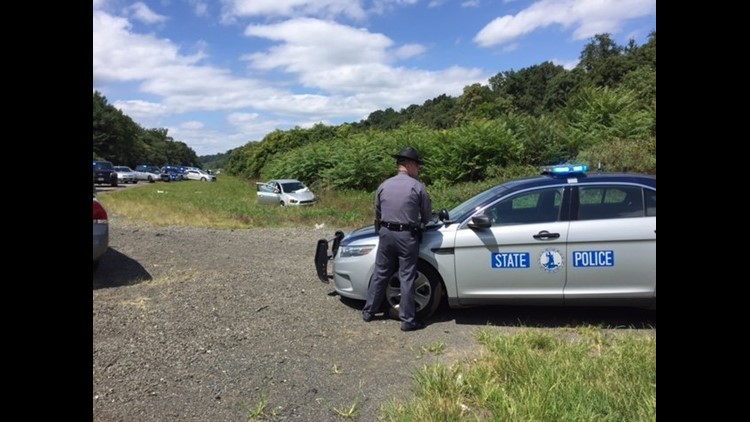Roanoke, VA — He carefully choreographed the slaying of the two journalists for maximum shock value.
And, judging from the items found in his car, he took equally meticulous steps to get away with it.
But a text message to a friend may have been Vester Lee Flanagan’s undoing.
A search warrant document that CNN obtained Thursday shows the lengths Flanagan went to avoid getting caught after gunning down reporter Alison Parker and her cameraman, Adam Ward.
The clues come from inside the rental car he used for his getaway, a Chevrolet Sonic.
Inside the subcompact four-door sedan — a far cry from his normal ride, a 2009 Ford Mustang — police found plenty of items Flanagan could have used to mask his identity.
A briefcase contained a wig, a black hat, a shawl, an umbrella and sunglasses. For the car, there were three license plates he could trade out on the vehicle that would already help obscure who he was.
And the use of a rental car was no last-minute decision by Flanagan. He rented it weeks before the shooting.
Despite the careful planning by Flanagan, it appears he helped tip off authorities, at least indirectly.
The tidbit of information is in an affidavit for the search warrant.
“Through the course of investigation, investigators identified Vester Lee Flanagan II as a person of interest based upon a text message to a friend making reference to having done something stupid,” the document said.
What police did with the information isn’t spelled out, but the text would have given them Flanagan’s cell phone number and with it they could have tracked his signal.
We do know that Virginia State Police spotted the rental car on Interstate 66.
A trooper tried to pull Flanagan over, police said, but he refused to stop and sped away before running off the road and crashing into an embankment.
Troopers found Flanagan inside with a self-inflicted gunshot wound, Virginia State Police Sgt. F.L. Tyler told reporters. He was taken to a hospital and pronounced dead Wednesday afternoon.
Unstable work history
By now, it is well known what may have spurred him to do what he did.
The warning signs stretch back at least as far as 2000, 12 years before Flanagan was hired at — and fired from — WDBJ, the station where Parker and Ward worked. In incident after incident in those years, Flanagan’s deeply troubled mental state was on full display.
Flanagan knew Ward. Flanagan’s exit from the station was less than cordial and Ward recorded his emotional outburst on camera.
Court documents from a discrimination suit that he filed show that Flanagan scoffed at Ward and flipped off the camera. Before police walked him out of the building, Flanagan handed his manager a small wooden cross and said, “You’ll need this.”
Flanagan had run-ins with many co-workers and was a poor performer, according to WDBJ’s general manager Jeff Marks.
Flanagan’s performance and behavior problems led to his bosses referring him to the company’s employee assistance program.
The managers did not request he reach out to the program because of his mental state, but because of his difficulty working with others, Marks said.
The final warning for the reporter came in December 2012, and he was fired in February 2013.
All of the claims that Flanagan made against the company were investigated Marks said. Those investigations concluded that no reasonable person would have taken the alleged instances as discrimination or harassment, he said.
Road rage
Earlier this summer, Flanagan was involved in a road rage incident.
Brandon Foster posted the video of the July 6 encounter on YouTube after Wednesday’s shooting.
“I called this man out at a red light for driving like a maniac,” Foster said. “He then followed me to my destination driving recklessly, and stopping traffic to continue the argument.”
There was no violence and no charges were filed.
Another TV station
An early indicator of Flanagan’s volatility came at a Florida TV station.
As news broke this week, Don Shafer heard a familiar name on the radio. “Vester Flanagan. He worked for me,” he said to himself.
“The hair on the back of my neck went up,” said Shafer, who is now news director at XETV in San Diego.
But when he hired Flanagan, Shafer was news director at WTWC in Tallahassee, Florida. The reporter who went by Bryce Williams made a nice impression on Shafer at first, but in 2000, he fired him over run-ins with colleagues.
“There were some issues with him and his personality that kind of spiraled down, and that’s why we had to get rid of him,” Shafer said.
Flanagan sued, alleging racial discrimination, but the suit was dismissed.
What did we miss?
But all of those things come in hindsight.
No one, it appears, thought that Flanagan would go to the terrible length he did this week.
No one picked up on what he said he felt — that he was a human powder keg “just waiting to go boom.”
After the shootings, WDBJ executives struggled to say what they could have done differently with the troubled employee.
“There were probably things we can do,” Marks said. “We can probably screen more, but by and large we get great employees here. One is going to slip through the cracks every now and then. I’m very proud of our hiring record.”
Before bringing him on staff, the station called Flanagan’s references, who all gave positive reviews, Marks said.
But Marks noted: “It’s very hard to get a negative reference these days. Most companies have policies that forbid their people from giving references. And so what you get a lot of is name, rank and serial number.
“I think anybody can make positive references happen if they try hard enough, so we exhausted what we could on that,” Marks said.
What now?
This week’s shooting renewed calls for stiffer gun control measures.
Parker’s father, Andy Parker, told CNN’s Anderson Cooper on Thursday night that he will honor his daughter’s memory by lobbying for laws that will make it harder for the mentally ill to purchase firearms. It was not clear whether Flanagan had been diagnosed with a mental illness.
“After Sandy Hook, and the theater shootings, everybody thought, gosh this is terrible,” he said. “We have got to do something to keep people that are mentally disturbed, we got to keep them away from guns and having the ability to get guns.”
Parker was reluctant at first to speak to reporters about his 24-year-old daughter’s killing, but her career as a journalist changed his mind.
It’s up to the media, he said, to prevent the story from fading.
“That’s what the (National Rifle Association) is thinking right now,” Parker said. “The NRA is saying, it will go away. And, you know, they are the most powerful lobby in the country. And someone has got … to take them on. By God, I am going to do it.”



